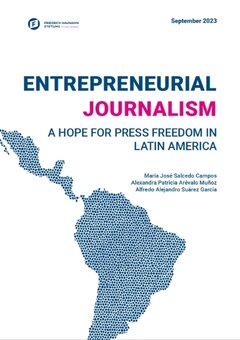Human Rights
Entrepreneurial Journalism: The Hope for Press Freedom in Latin America

Latin America represents one of the most risky areas for journalists. The political instability and economic precariousness faced by many journalists are two major challenges to press freedom. Journalism and media models in Latin America tend to be aligned with political power, so traditional media tend to concentrate power and value the relationship they have with governments. However, in recent years independent journalism has been growing in the region. The advance of technology and digitalization has opened new doors of development, allowing greater interconnection between users, which has generated new ways of doing journalism through digital media, podcasts and subscription platforms.
At the Friedrich Naumann Foundation for Freedom, we consider it crucial to explore the opportunities that exist in Latin America for alternative media, where citizens can access information away from the official narratives. Freedom of the press is the pillar of any open and pluralistic society, because it is through information that people, citizens, can be empowered to make informed decisions. What happens when the personal and financial security of those who perform this valuable work is in danger?
Given the adverse context for the practice of journalism in various Latin American countries, it is crucial to reflect on the future of this profession in the region, especially in the face of regimes that undermine journalistic work. Beyond safety, it is imperative to question the models through which journalists can obtain sustainable remuneration and resources for their work. There are good practices and financing models that do not necessarily fit the traditional media configuration, but adapt to new technologies, the use of social networks, freelance work and the creation of new independent media, which are often the only viable avenue, especially for journalists working from exile. This analysis gathers the experience of journalists from the region and offers a perspective on the financial situation and possible scenarios for the sustainability of press freedom in a region adverse to it.
This analysis offers a new vision of Latin American journalism, which seeks to maintain its voice despite authoritarianism, censorship and insecurity. We invite you to read the complete publication and learn more about each country's panorama here.

